必修一 unit 1 Friendship grammar课件(43张)
文档属性
| 名称 | 必修一 unit 1 Friendship grammar课件(43张) |
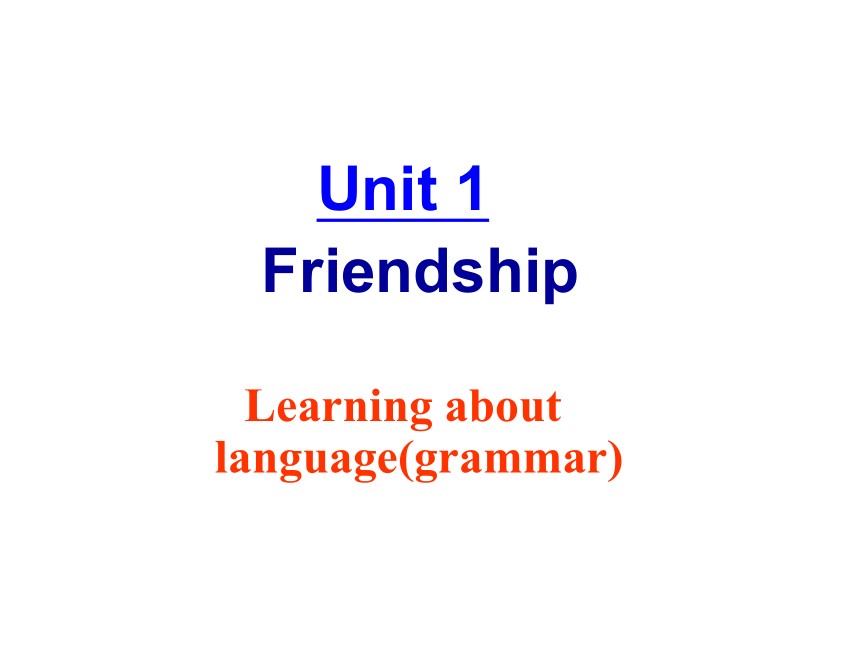
|
|
| 格式 | zip | ||
| 文件大小 | 1022.1KB | ||
| 资源类型 | 教案 | ||
| 版本资源 | 人教版(新课程标准) | ||
| 科目 | 英语 | ||
| 更新时间 | 2018-10-15 00:00:00 | ||
图片预览

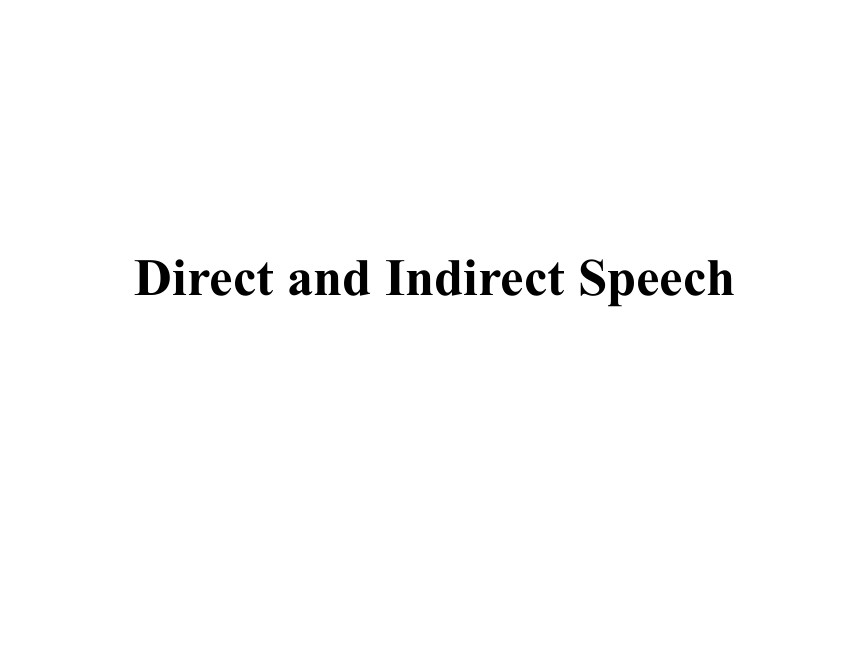
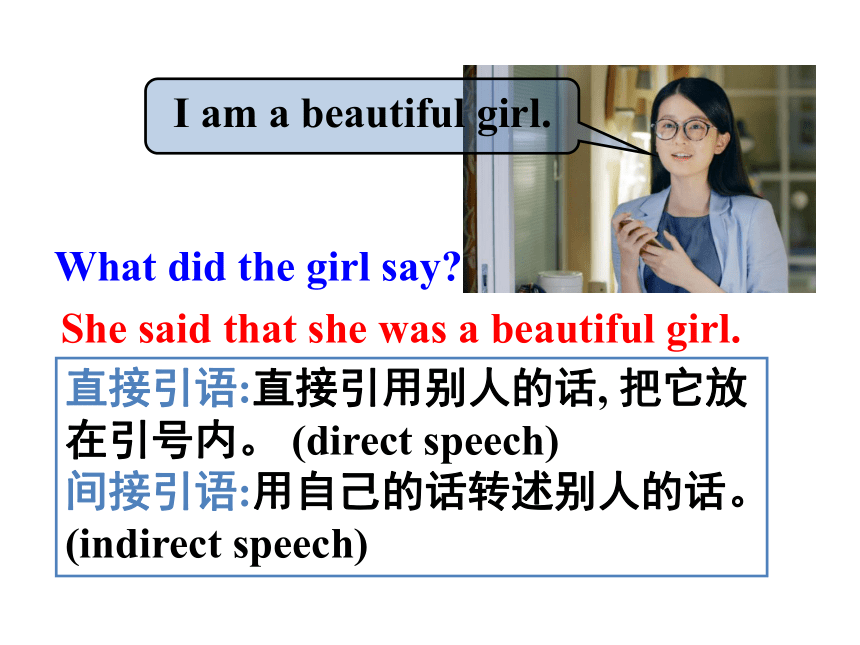
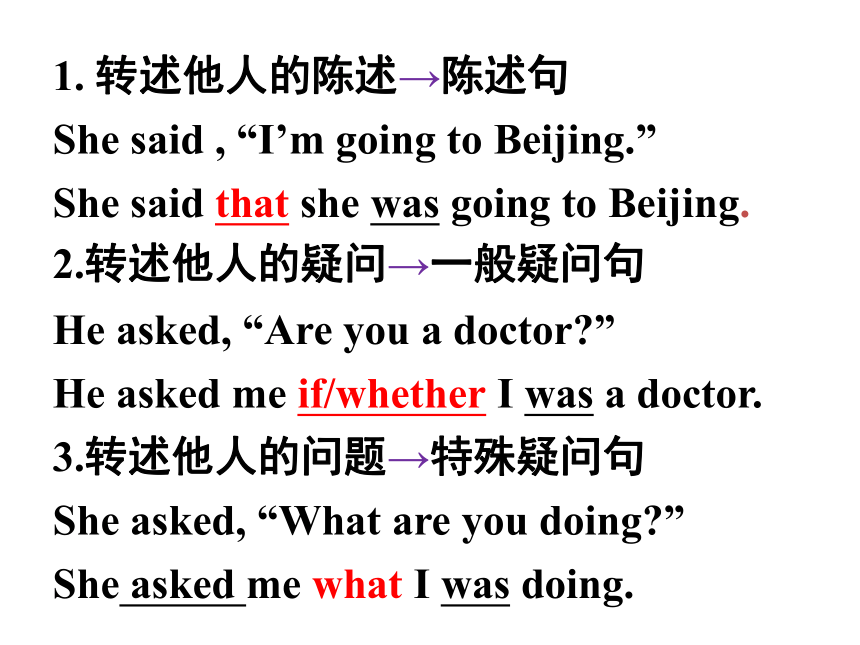
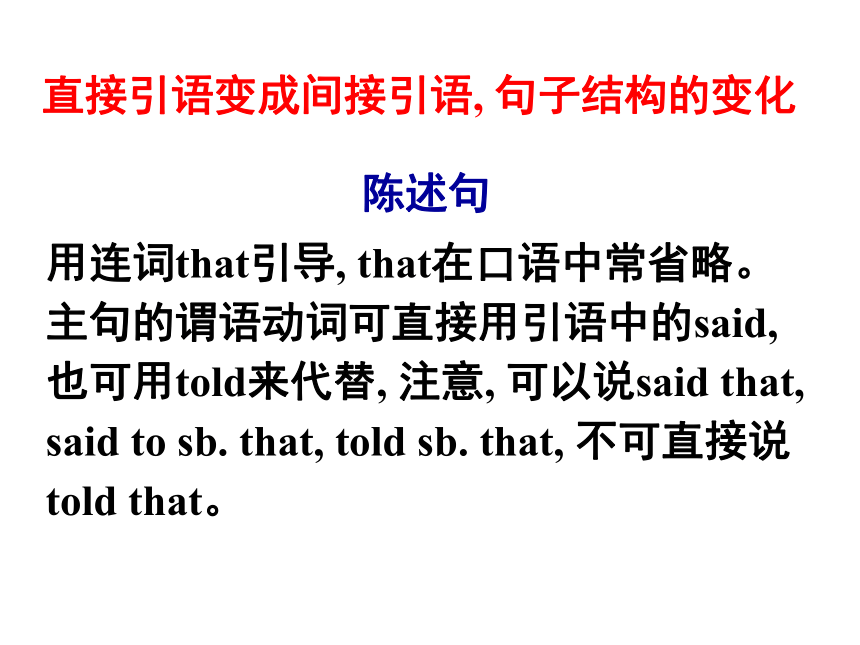
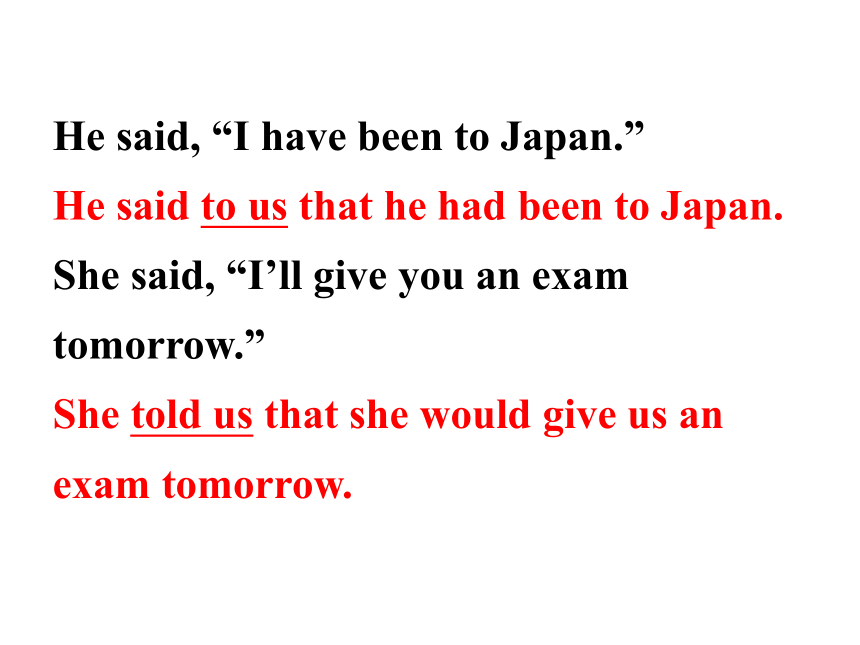

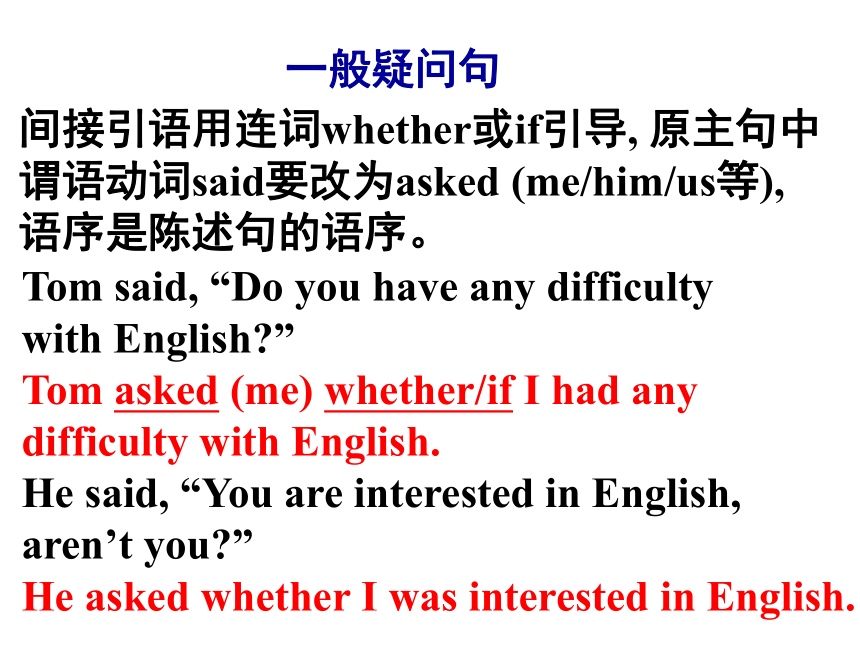
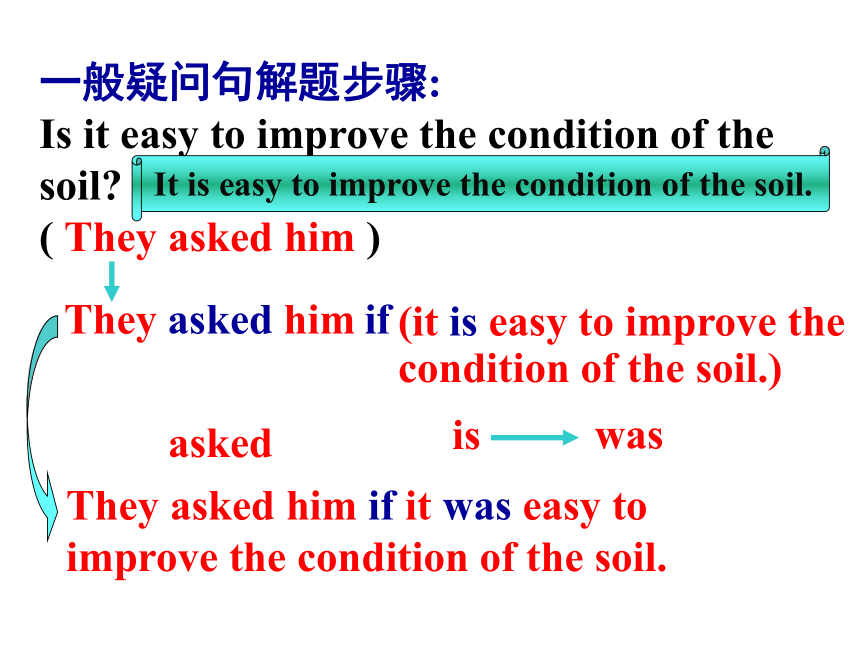
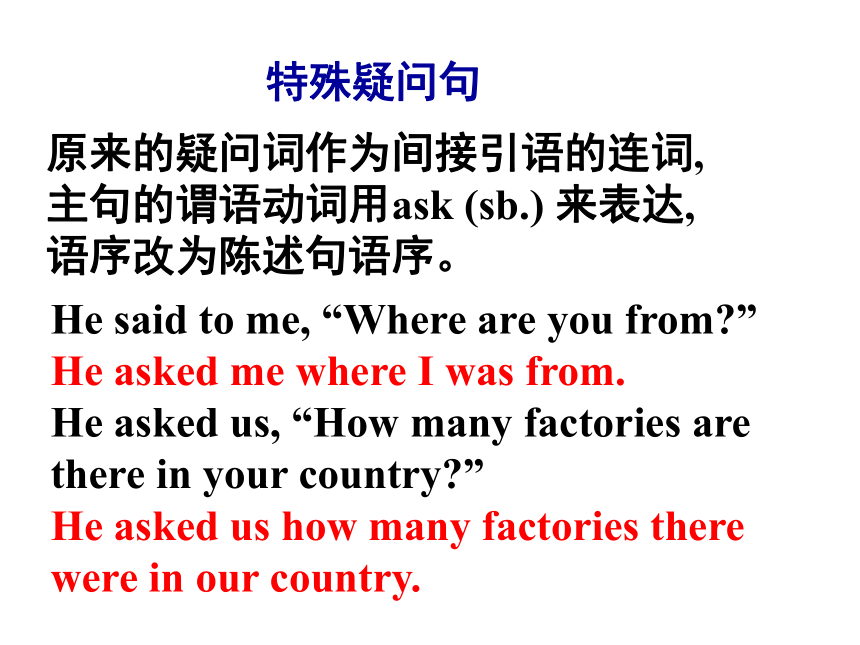
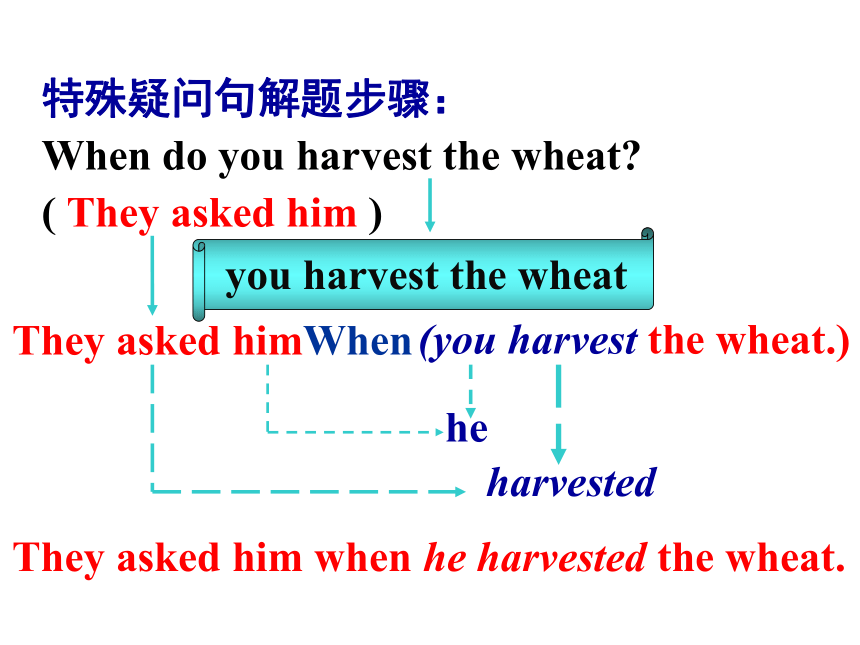
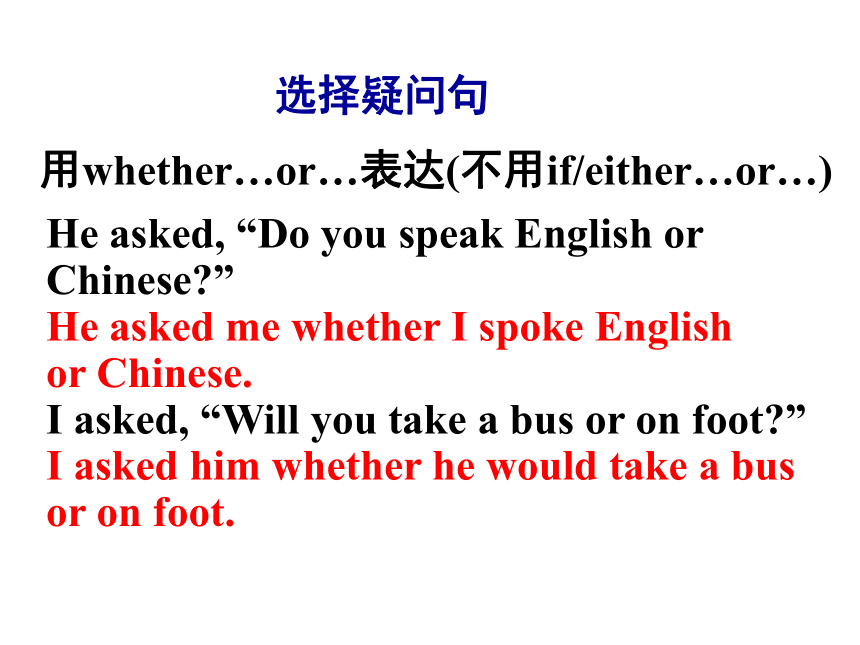
文档简介
Unit 1
Friendship
Learning about language(grammar)
Direct and Indirect Speech
She said that she was a beautiful girl.
What did the girl say?
直接引语:直接引用别人的话, 把它放在引号内。 (direct speech)
间接引语:用自己的话转述别人的话。(indirect speech)
I am a beautiful girl.
转述他人的陈述→陈述句
She asked me what I was doing.
She said , “I’m going to Beijing.”
She said that she was going to Beijing.
He asked, “Are you a doctor?”
He asked me if/whether I was a doctor.
She asked, “What are you doing?”
2.转述他人的疑问→一般疑问句
3.转述他人的问题→特殊疑问句
陈述句
用连词that引导, that在口语中常省略。主句的谓语动词可直接用引语中的said, 也可用told来代替, 注意, 可以说said that, said to sb. that, told sb. that, 不可直接说 told that。
直接引语变成间接引语, 句子结构的变化
He said, “I have been to Japan.”
He said to us that he had been to Japan.
She said, “I’ll give you an exam
tomorrow.”
She told us that she would give us an
exam tomorrow.
陈述句解题步骤:
Sarah said to her friends
that
(I don’t like computers.)
didn’t
she
Sarah said to her friends that she didn’t like computers.
“I don’t like computers,”
Sarah said to her friends.
间接引语用连词whether或if引导, 原主句中
谓语动词said要改为asked (me/him/us等),
语序是陈述句的语序。
一般疑问句
Tom said, “Do you have any difficulty
with English?”
Tom asked (me) whether/if I had any
difficulty with English.
He said, “You are interested in English,
aren’t you?”
He asked whether I was interested in English.
一般疑问句解题步骤:
Is it easy to improve the condition of the soil?
( They asked him )
They asked him
if
It is easy to improve the condition of the soil.
asked
is
was
They asked him if it was easy to improve the condition of the soil.
(it is easy to improve the condition of the soil.)
原来的疑问词作为间接引语的连词,
主句的谓语动词用ask (sb.) 来表达,
语序改为陈述句语序。
特殊疑问句
He said to me, “Where are you from?”
He asked me where I was from.
He asked us, “How many factories are
there in your country?”
He asked us how many factories there
were in our country.
特殊疑问句解题步骤:
When do you harvest the wheat?
( They asked him )
They asked him
When
you harvest the wheat
(you harvest the wheat.)
he
harvested
They asked him when he harvested the wheat.
He asked, “Do you speak English or
Chinese?”
He asked me whether I spoke English
or Chinese.
I asked, “Will you take a bus or on foot?”
I asked him whether he would take a bus
or on foot.
用whether…or…表达(不用if/either…or…)
选择疑问句
谓语动词时态变化需要注意几点:
1. 直接引语表述的是客观真理, 变为间接
引语时, 时态不变。
The geography teacher said, “The sun rises in the east and sets in the west.”
The geography teacher told us that the sun rises in the east and sets in the west.
2. 如果直接引语所表述的内容在目前
和说话时同样有效, 变间接引语时,
时态可不变。
The children said, “We love this game.”
The children told us that they love
that game.
She says that she’ll never forget the days in the country.
3. 主句谓语动词的时态是现在时态,
在引述时, 时态不变。
She says, “I’ll never forget the days in the country.”
Direct speech Indirect speech
Sentence structure statement say/tell sb. (that)+从句
一般疑问句 ask/wonder whether/if +
陈述句语序
特殊疑问句 ask/wonder wh-word +陈述句语序
在直接引语变为间接引语时需要
注意的变化
1. 注意时态的变化
2. 注意人称和指示代词变化
3. 注意时间和地点的变化
4. 注意个别趋向动词的变化
直接引语
direct speech 间接引语
indirect speech
一般现在时 一般过去时
现在进行时 过去进行时
现在完成时 过去完成时
一般过去时 过去完成时
一般将来时 过去将来时
过去完成时 过去完成时
Direct Speech Indirect Speech
Pronouns 第一人称 第三人称
第二人称 第一或第三人称
this that
these those
Direct Speech Indirect Speech
时
间
状
语 Now then
Today that day
Yesterday the day before
This week/month That week/month
Last week/month That week/month
before
three days ago three days before
tomorrow the next day/the
following day
Direct Speech Indirect Speech
地点状语 Here there
方向性动词 come go
bring take
borrow lend
直接引语中的助动词 间接引语中的助动词
shall should
Should should (不变)
will would
would Would (不变)
may might
might might (不变)
can could
could could (不变)
must must/had to
直接引语中的助动词 间接引语中的助动词
He said he…
plays football
is playing
has played
played
will play
had played
played football
was playing
had played
had played
would play
had played
Attention:
When direct speech is about:
a) a truth 真理
b) a timetable 时间表
c) a saying/proverb/quotation 格言/引用语
d) An adverbial indicating the past
过去的时间状语
There are some cases in which we don’t need to change the tense in indirect speech.
He said, “the earth goes around the sun.”
2. He said, “The train leaves at 7:30p.m.”
3. He said, “Rome isn’t built in a day.”
4. Tom said, “I was born in July, 1978.”
Change direct speech into indirect speech:
He said that the earth goes around the sun.
He said that the train leaves at 7:30p.m.
He said that Rome isn’t built in a day.
Tom said he was born in July, 1978.
5. He said, “I’m afraid I can’t finish
this work.”
6. He said, “I haven’t heard from him
since May.”
7. Tom said “I will see you next week.”
He said that he was afraid he couldn’t finish that work.
He said that he hadn’t heard from
him since May.
Tom said that he would see me
the next week.
8. “Why were you late again?” The teacher
said to me.
9. “Have you been to Paris?” My classmate
asked me.
10. His friends asked him if he would go to
Dalian.
The teacher asked me why I was late again.
His friends asked him, “Will you
go to Dalian?”
My classmate asked me if I had been to Paris.
Try to do Student Book P5 Exercise2
Change the sentences either into
direct speech or indirect speech:
Anne said that she didn’t know the
address of her new home.
2. Anne told her father that she had got
tired of looking at nature through dirty
curtains and dusty windows.
3. The girl said that she needed to pack up
her things in the suitcase very quickly.
4. Her father asked her why she had
chosen her diary and old letters.
5. “Are you very hot with so many clothes
on?” Mother asked/said to her.
6. “What else have you hidden under your
overcoat?” Margot asked her.
7. “When shall we go back home?” Anne
asked her father.
8. “Why did you talk so much to that
boy?” Father asked Anne.
3. Pair work. Based on the form of weather report in the textbook, try to use indirect speech in your dialogue.
GM: what’s the weather in Beijing
tomorrow? I can’t hear the man
clearly on the TV.
GC: that’s right, I can help. The man
said…
GM: what did he say about shanghai?
GC: …
Exercise
1. Jack said to me, “You look worried
today.”
Jack told me that ___ worried ___.
A. he looks…today
B. you look…today
C. we looked…that day
D. I looked…that day
D
Choose the best answer.
2. We said to her, “They’re walking
through the street now.”
We told her that ____ through the
street ___.
A. we were walking…then
B. you are walking…now
C. they were walking…then
D. they walking…now
C
3. Mr. Black said, “I have walked a
long way this week.”
Mr. Black said that ___ a long way ___.
A. I had walked…last week
B. he had walked…that week
C. I walked…last week
D. he has walked…this week
B
4. The man thought, “I shall take it
back tomorrow.”
The man thought that ____ take it
back ____.
A. I shall…tomorrow
B. I shall…the next day
C. he should…tomorrow
D. he would…the next day
D
5. They said to us, “Are you afraid
to leave this house ?”
They asked us ____ afraid to leave
_____ house.
A. that were we…this
B. that we were…that
C. if were we …this
D. if we were…that
D
6. Jane said, “What did he hear about
a week ago?”
Jane asked ____ about _____.
A. that he heard…a week ago
B. what he had heard…the week before
C. what he had herd…a week ago
D. if he heard…the week ago
B
7. She asked, “Whose house will he
break into next time?”
She asked whose house ____ break
into _____.
A. will he…next time
B. would he…the next time
C. he would…the next time
D. he will…next time
C
8. Jack said to her, “Where do you
spend your holidays?”
Jack asked her where ____ holidays.
A. she spent her
B. you spend your
C. she spend her
D. you spent your
A
9. Black asked me, “Why haven’t
you left here yet?”
Black asked me why ____ yet.
A. I hadn’t left there
B. I haven’t left here
C. hadn’t I left there
D. haven’t I left here
A
10. The teacher asked her, “Does the
sun rise in the east?”
The teacher asked her ___ the
sun ___ in the east.
A. if…rise
B. if…rises
C. whether…rose
D. whether did …rise
B
Homework
Review the rules of direct
speech and indirect speech.
Thank You!
Friendship
Learning about language(grammar)
Direct and Indirect Speech
She said that she was a beautiful girl.
What did the girl say?
直接引语:直接引用别人的话, 把它放在引号内。 (direct speech)
间接引语:用自己的话转述别人的话。(indirect speech)
I am a beautiful girl.
转述他人的陈述→陈述句
She asked me what I was doing.
She said , “I’m going to Beijing.”
She said that she was going to Beijing.
He asked, “Are you a doctor?”
He asked me if/whether I was a doctor.
She asked, “What are you doing?”
2.转述他人的疑问→一般疑问句
3.转述他人的问题→特殊疑问句
陈述句
用连词that引导, that在口语中常省略。主句的谓语动词可直接用引语中的said, 也可用told来代替, 注意, 可以说said that, said to sb. that, told sb. that, 不可直接说 told that。
直接引语变成间接引语, 句子结构的变化
He said, “I have been to Japan.”
He said to us that he had been to Japan.
She said, “I’ll give you an exam
tomorrow.”
She told us that she would give us an
exam tomorrow.
陈述句解题步骤:
Sarah said to her friends
that
(I don’t like computers.)
didn’t
she
Sarah said to her friends that she didn’t like computers.
“I don’t like computers,”
Sarah said to her friends.
间接引语用连词whether或if引导, 原主句中
谓语动词said要改为asked (me/him/us等),
语序是陈述句的语序。
一般疑问句
Tom said, “Do you have any difficulty
with English?”
Tom asked (me) whether/if I had any
difficulty with English.
He said, “You are interested in English,
aren’t you?”
He asked whether I was interested in English.
一般疑问句解题步骤:
Is it easy to improve the condition of the soil?
( They asked him )
They asked him
if
It is easy to improve the condition of the soil.
asked
is
was
They asked him if it was easy to improve the condition of the soil.
(it is easy to improve the condition of the soil.)
原来的疑问词作为间接引语的连词,
主句的谓语动词用ask (sb.) 来表达,
语序改为陈述句语序。
特殊疑问句
He said to me, “Where are you from?”
He asked me where I was from.
He asked us, “How many factories are
there in your country?”
He asked us how many factories there
were in our country.
特殊疑问句解题步骤:
When do you harvest the wheat?
( They asked him )
They asked him
When
you harvest the wheat
(you harvest the wheat.)
he
harvested
They asked him when he harvested the wheat.
He asked, “Do you speak English or
Chinese?”
He asked me whether I spoke English
or Chinese.
I asked, “Will you take a bus or on foot?”
I asked him whether he would take a bus
or on foot.
用whether…or…表达(不用if/either…or…)
选择疑问句
谓语动词时态变化需要注意几点:
1. 直接引语表述的是客观真理, 变为间接
引语时, 时态不变。
The geography teacher said, “The sun rises in the east and sets in the west.”
The geography teacher told us that the sun rises in the east and sets in the west.
2. 如果直接引语所表述的内容在目前
和说话时同样有效, 变间接引语时,
时态可不变。
The children said, “We love this game.”
The children told us that they love
that game.
She says that she’ll never forget the days in the country.
3. 主句谓语动词的时态是现在时态,
在引述时, 时态不变。
She says, “I’ll never forget the days in the country.”
Direct speech Indirect speech
Sentence structure statement say/tell sb. (that)+从句
一般疑问句 ask/wonder whether/if +
陈述句语序
特殊疑问句 ask/wonder wh-word +陈述句语序
在直接引语变为间接引语时需要
注意的变化
1. 注意时态的变化
2. 注意人称和指示代词变化
3. 注意时间和地点的变化
4. 注意个别趋向动词的变化
直接引语
direct speech 间接引语
indirect speech
一般现在时 一般过去时
现在进行时 过去进行时
现在完成时 过去完成时
一般过去时 过去完成时
一般将来时 过去将来时
过去完成时 过去完成时
Direct Speech Indirect Speech
Pronouns 第一人称 第三人称
第二人称 第一或第三人称
this that
these those
Direct Speech Indirect Speech
时
间
状
语 Now then
Today that day
Yesterday the day before
This week/month That week/month
Last week/month That week/month
before
three days ago three days before
tomorrow the next day/the
following day
Direct Speech Indirect Speech
地点状语 Here there
方向性动词 come go
bring take
borrow lend
直接引语中的助动词 间接引语中的助动词
shall should
Should should (不变)
will would
would Would (不变)
may might
might might (不变)
can could
could could (不变)
must must/had to
直接引语中的助动词 间接引语中的助动词
He said he…
plays football
is playing
has played
played
will play
had played
played football
was playing
had played
had played
would play
had played
Attention:
When direct speech is about:
a) a truth 真理
b) a timetable 时间表
c) a saying/proverb/quotation 格言/引用语
d) An adverbial indicating the past
过去的时间状语
There are some cases in which we don’t need to change the tense in indirect speech.
He said, “the earth goes around the sun.”
2. He said, “The train leaves at 7:30p.m.”
3. He said, “Rome isn’t built in a day.”
4. Tom said, “I was born in July, 1978.”
Change direct speech into indirect speech:
He said that the earth goes around the sun.
He said that the train leaves at 7:30p.m.
He said that Rome isn’t built in a day.
Tom said he was born in July, 1978.
5. He said, “I’m afraid I can’t finish
this work.”
6. He said, “I haven’t heard from him
since May.”
7. Tom said “I will see you next week.”
He said that he was afraid he couldn’t finish that work.
He said that he hadn’t heard from
him since May.
Tom said that he would see me
the next week.
8. “Why were you late again?” The teacher
said to me.
9. “Have you been to Paris?” My classmate
asked me.
10. His friends asked him if he would go to
Dalian.
The teacher asked me why I was late again.
His friends asked him, “Will you
go to Dalian?”
My classmate asked me if I had been to Paris.
Try to do Student Book P5 Exercise2
Change the sentences either into
direct speech or indirect speech:
Anne said that she didn’t know the
address of her new home.
2. Anne told her father that she had got
tired of looking at nature through dirty
curtains and dusty windows.
3. The girl said that she needed to pack up
her things in the suitcase very quickly.
4. Her father asked her why she had
chosen her diary and old letters.
5. “Are you very hot with so many clothes
on?” Mother asked/said to her.
6. “What else have you hidden under your
overcoat?” Margot asked her.
7. “When shall we go back home?” Anne
asked her father.
8. “Why did you talk so much to that
boy?” Father asked Anne.
3. Pair work. Based on the form of weather report in the textbook, try to use indirect speech in your dialogue.
GM: what’s the weather in Beijing
tomorrow? I can’t hear the man
clearly on the TV.
GC: that’s right, I can help. The man
said…
GM: what did he say about shanghai?
GC: …
Exercise
1. Jack said to me, “You look worried
today.”
Jack told me that ___ worried ___.
A. he looks…today
B. you look…today
C. we looked…that day
D. I looked…that day
D
Choose the best answer.
2. We said to her, “They’re walking
through the street now.”
We told her that ____ through the
street ___.
A. we were walking…then
B. you are walking…now
C. they were walking…then
D. they walking…now
C
3. Mr. Black said, “I have walked a
long way this week.”
Mr. Black said that ___ a long way ___.
A. I had walked…last week
B. he had walked…that week
C. I walked…last week
D. he has walked…this week
B
4. The man thought, “I shall take it
back tomorrow.”
The man thought that ____ take it
back ____.
A. I shall…tomorrow
B. I shall…the next day
C. he should…tomorrow
D. he would…the next day
D
5. They said to us, “Are you afraid
to leave this house ?”
They asked us ____ afraid to leave
_____ house.
A. that were we…this
B. that we were…that
C. if were we …this
D. if we were…that
D
6. Jane said, “What did he hear about
a week ago?”
Jane asked ____ about _____.
A. that he heard…a week ago
B. what he had heard…the week before
C. what he had herd…a week ago
D. if he heard…the week ago
B
7. She asked, “Whose house will he
break into next time?”
She asked whose house ____ break
into _____.
A. will he…next time
B. would he…the next time
C. he would…the next time
D. he will…next time
C
8. Jack said to her, “Where do you
spend your holidays?”
Jack asked her where ____ holidays.
A. she spent her
B. you spend your
C. she spend her
D. you spent your
A
9. Black asked me, “Why haven’t
you left here yet?”
Black asked me why ____ yet.
A. I hadn’t left there
B. I haven’t left here
C. hadn’t I left there
D. haven’t I left here
A
10. The teacher asked her, “Does the
sun rise in the east?”
The teacher asked her ___ the
sun ___ in the east.
A. if…rise
B. if…rises
C. whether…rose
D. whether did …rise
B
Homework
Review the rules of direct
speech and indirect speech.
Thank You!
